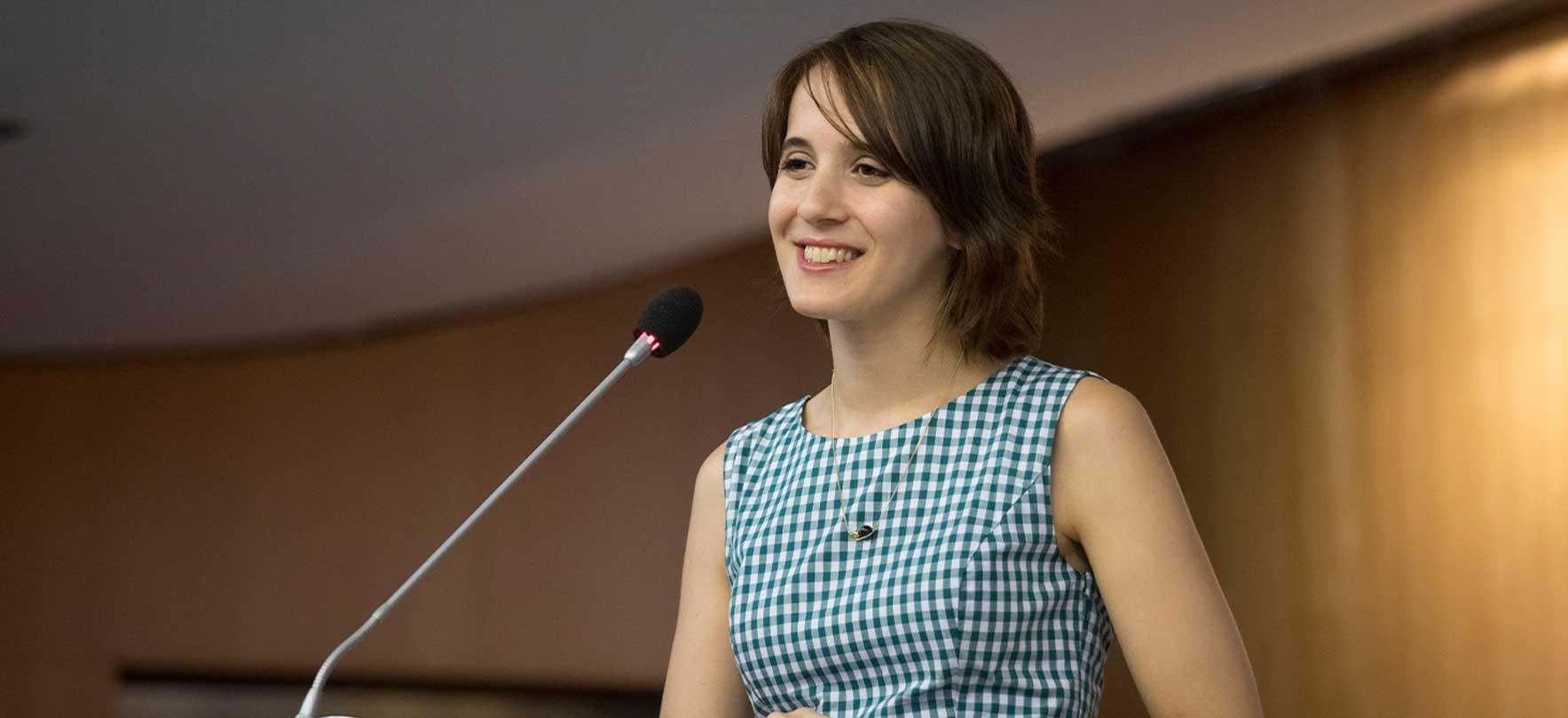The Master in Public and Social Policies, offered in collaboration with Johns Hopkins University, is designed for an international audience and an international benchmark in its field, backed up by a history of 23 programs. Become an agent of social improvement through public and social policies.
The Master in Public and Social Policies is a program taught at the UPF Barcelona School of Management in collaboration with the Johns Hopkins University, two institutions of international reference that occupy very prominent positions in the different research and teaching rankings.
The Master will provide you with the concepts, tools, and abilities needed to analyse, design, implement, and evaluate innovative public policies to improve the social well-being and quality of life of populations, responding to social challenges through public and social policies, and integrating the network of public, private, and community actors linked to them.
You will receive the training and tools you need to interpret current social needs (work, educational, environmental, political, health, housing, management, and many more) and develop innovative responses to them, in the context of the political and social challenges that face contemporary societies.
You will learn to understand and analyse quantitative and qualitative information on the well-being, quality of life, and health of populations, to diagnose social needs and priorities, and to make proposals for improvement. Starting from a solid conceptual and analytical basis linked to public policies, the program stands out especially for its sectoral and transversal approach to public and social policies.
The Master has a large teaching team of recognized experts and professionals who will support you in the training process so that you can obtain in-depth knowledge of the different dimensions of the welfare state and public and social policies, as well as fundamental social issues such as housing, social exclusion, the labour market, public health, and climate change, among others. In addition, the Master includes professional and research internships in public, private, community, national, and international institutions and entities, as well as in specialized centres.
The Master in Public and Social Policies is endorsed by Pompeu Fabra University, the 1st Spanish university and the 15th best university in the world (of those with less than 50 years), according to the Times Higher Education ranking. In addition, UPF Barcelona School of Management has EQUIS accreditation, the most prestigious institutional recognition for business schools globally.
The Master in Public and Social Policies has a Steering Committee made up of the following members:
- Joan Benach. Professor of Sociology at Pompeu Fabra University, Director of GREDS_EMCONET, and Co-Director of the JHU-UPF Public Policy Center.
- José Manuel Martínez Sierra. Jean Monnet ad personam Professor in European Union Law and Government. Director General and Provost of the Barcelona School of Management at Pompeu Fabra University (UPF-BSM).
- Keshia Pollack. Director of the Johns Hopkins Institute for Health and Social Policy and Co-Director of the JHU-UPF Public Policy Center.
- Donald Steinwachs. Professor at the Johns Hopkins Center for Health Services and Outcomes Research.

Why choose this program
International recognition
Study at a school accredited by EQUIS, an international distinction that guarantees the quality of our institution and makes us the 1st school of management linked to a public university with this accreditation in our country.
Two leading institutions
The Master is developed at the UPF Barcelona School of Management in collaboration with Johns Hopkins University, under the rigour and academic excellence characteristic to both institutions.
Reference program in the field of public and social policies
The Master is classified as the 2nd best master's degree in Political Science and Administration by the El Mundo Ranking of the best 250 masters in Spain, and is backed by a history of 23 programs.
Learn from experts in the sector
The Master has a very broad and highly specialized teaching team in the different areas of national and international public policies, with a combination of academic and professional profiles that help to offer an approach to public and social policies both from the theoretical and conceptual field as well as from research and practice.
Access a specific study plan
The study plan, designed by our experts in public and social policies, delves especially into all aspects related to these policies in Spain, Europe, and Latin America. Training of the highest level in the analysis of public and social policies, and institutional capacities, as well as in research methodologies looking at their approach, combining sectoral strategies with a transversal focus to offer an integrated vision of the challenges in public and social policies, and how to offer effective responses to them.
Opportunities to participate in JHU-related activities
Second-year students may be eligible for scholarships for some of the courses offered annually by the JHU Fall Institute in Barcelona (political, environmental and social determinants of health), taught by JHU in collaboration with the Public Health Agency of Barcelona. There is also the possibility of short academic exchange stays between the JHU and the UPF.
Who is it for?
The Master in Public and Social Policies is aimed at professionals in the management of public and social policies, as well as graduates from areas such as political science, law, economics, sociology, and other social sciences.
Accreditations
UPF Barcelona School of Management is the management school of Pompeu Fabra University, the 1st Ibero-American university and the 16th placed university in the world, among those under 50 years of age, according to the Times Higher Education ranking.
UPF Barcelona School of Management has EQUIS accreditation, the most prestigious institutional recognition for business schools globally, and places itself among the top business schools in the world.
The Master in Public and Social Policies is an official master's degree and has the academic recognition of the Ministry of Education of the Government of Spain. The Quality Agency of the University System of Catalonia (AQU) has also institutionally accredited UPF-BSM. This accreditation certifies all the official master's degrees that we teach and recognizes the quality of our educational model in accordance with the criteria of the European Higher Education Area (EHEA).
In 2023, UPF-BSM received Level 4 in the Positive Impact Rating (PIR), an international classification led by the opinion of the students themselves about the sustainability commitment of the world's leading business schools, recognizing UPF-BSM as a "transformative school".
Curriculum
The Master in Public and Social Policies is developed over two academic years, combining theoretical and practical elements through different subjects grouped into four main areas or modules.
During the first year, the Master concentrates on the contents related to the fundamentals of the analysis of public and social policies, and the research techniques that facilitate their development. In the second year, a series of subjects linked to the in-depth analysis and evaluation of public and social policies are taken, as well as to the institutional capacities of public organizations and the networks of actors to promote them.
Throughout both years, the subjects related to public policies of a sectoral and transversal type are developed jointly between two programs. The focus, diversity, and in-depth focus of these sectoral and transversal contents represent one of the most characteristic and distinctive features of the Master.
In addition, during the second year, and according to the thematic and professional interests and concerns of each participant, the Master's Final Project must be carried out: an essential exercise to personalize and intensify the contents of the Master.
The structure of the classes (two weeks a month, Monday to Friday, from 4.30 pm to 8.30 pm, with some exceptions) is designed for students to combine academic and professional and family life as much as possible.
Curricular Internships
The professional and research internships are usually developed during the second year of the program and can be carried out in public or private organizations (such as public administrations, governments, NGOs, foundations and universities or applied and/or academic research centers) with which the UPF Barcelona School of Management has collaboration agreements.
Master's Final Project
The Master's Final Project is one of the most important courses of the program. It is intended to culminate the development of research, analysis, critical reflection and precise writing skills, through the deep study of a topic selected by each student within the framework of the subjects studied throughout the Master.
The Master's Final Project consists of planning, carrying out, presenting and defending a research or professional project on a specific topic or area. Its purpose is to promote the application of skills such as the ability to plan a process, solve problems, analyze and interpret results, or defend proposals through effective and efficient communication, among others.
Complementary activities
The Master in Public and Social Policies also includes the possibility of participating in practical activities and activities for personal and professional growth such as:
- UPF-BSM Inside: is a group of interdisciplinary subjects (applied data, communication, creativity, innovation and project management, sustainability and leadership among others) that, if you take this program, you can access at no additional cost. They are 100% online and you can take them throughout the academic year at your own pace, as they have been designed as self-study subjects.
- International mobility: The UPF Barcelona School of Management offers you the possibility of expanding your training and international vision through the International Mobility Programme. Extend your studies extracurricularly, during the academic year following the completion of your Master's, at a top-level institution. Limited places.
Qualification obtained
Once students have completed the course they will obtain the Màster Universitari en Polítiques Públiques i Socials - Máster Universitario en Políticas Públicas y Sociales official Master's Degree, issued by the Pompeu Fabra University.
Issuance of official Master's Degrees: The amount stipulated in the DOGC (Official Gazette of the Government of Catalonia) must be paid for the rights to issue the degree. This rate varies annually and the rate in force at the time of application for the degree will be applied.
Faculty
The Master in Public and Social Policies has teachers from the different areas of national and international public and social policies.
The profile and diversity of the teaching staff reflects the quality of the two institutions involved, the UPF Barcelona School of Management and the Public Policy Center, promoted together with the Johns Hopkins University.
In addition, a very notable cast of experts linked to the different fields related to public and social policies is involved. This group includes prominent politicians, managers, and professionals from different national and international public organizations, and experts linked to non-governmental organizations that work on public and social policies.
Academic directors
Coordinator
Faculty
Collaborating faculty
- Manuel Aguilar Hendrickson
Lecturer at the Department of Social Work and Social Services at the University of Barcelona. - Marc Àmbit
Consultant at the Catalan University Quality Assurance Agency.
Lecturer in Project Management at Pompeu Fabra University, Toulouse Business School, and CETT. - Bentley Allan
Assistant lecturer in Political Science at Johns Hopkins University. - Javier Arregui
Lecturer in Political Science at Pompeu Fabra University.
He was also a research fellow at the Inter-University Centre for Social Science Theory and Methodology at the University of Groningen (the Netherlands). - Lucía Artazcoz
Director of the Community Services Institute, Barcelona Public Health Agency.
Adjunct Lecturer at Johns Hopkins University. Director of the Online Biomedical Research Centre (CIBER) for Epidemiology and Public Health's Transversal Program on Inequalities. - Joan Benach
Director of the Health Inequalities Research Group and the Employment Conditions Network (GREDS-EMCONET).
Lecturer in Public and Occupational Health at Pompeu Fabra University. - Xavier Bonal Sarro
Director of the research group Globalization, Education and Social Policies (GEPS) at the Autonomous University of Barcelona.
Lecturer at the Department of Sociology at the Autonomous University of Barcelona. - Carme Borrell
Director of Barcelona Public Health Agency
PhD in Public Health, specialist in preventive medicine and public health and in family and community health
Associate Professor at Pompeu Fabra University
Also, she is Head Researcher of the EU-funded SOPHIE project and former Director of Spanish magazine Gaceta Sanitaria from 2010 to 2016. - Nuria Bosch
Fiscal Policy Researcher at the Barcelona Institute of Economics.
Professor in Applied Economics at the University of Barcelona. - Alex Costa
Department of analysis of the municipal data office of the city council of Barcelona.
PdD in Economics from University of Barcelona.
General Director of Statistic Planning at INE and Deputy Director of Economics Statistic Idescat. - José M. Freire
Head of the Department of International Health at the National Health School / Carlos III Institute of Health.
He was also the President of the European Management Association (EHMA). - Joan Carles Gallego Herrera
Ex-secretary of the CCOO de Catalunya trade union. - Eduardo Garzón
Doctor in Economics and Business.
Professor at the Autonomous University of Madrid and at the JHU-UPF Public Policy Centre. - Ricard Gomà
Spokesperson for ICV-EUiA (a coalition between the Green Party and the United Alternative Left Party) on the Barcelona City Council.
Lecturer in Political Science at the Autonomous University of Barcelona.
He was also the Second Deputy of the Mayor of Barcelona. - Maria Jose Gonzalez Lopez
Researcher at the Gender Studies Centre at UPF.
Adjunct lecturer at the Department of Political and Social Sciences at UPF. - Joan Guix
Director of the Camp de Tarragona Regional Service of the Agency for Health Protection of the Government of Catalonia.
Adjunct lecturer at Rovira i Virgili University (Tarragona). - Mateu Hernandez
General Manager of Economic Development on the Barcelona City Council.
He is also the General Director of Barcelona Global. Member of the International Advisory Board for the Fourth Strategic Plan for New York. - Adolfo Jimenez Fernandez
Economist, member of the European Institute of Social Security.
He was also the General Secretary of the Ibero-American Social Security Organization and the Spanish Social Security. - Daniel Montolio Estivill
Member of the Barcelona Economics Institute.
Associate lecturer at the Department of Public Economy, Political Economy and the Spanish Economy. - Carme Montserrat
Professor at the Faculty of Education and Psychology of the UdG.
Principal Researcher for Liberi, Research Group in Childhood, Youth, and Community. - Josep Muñoz
Head of the Provincial Council of Barcelona's Social Welfare Service. - Francesc Pedró
Senior Analyst at the OECD Centre for Educational Research and Innovation.
Professor at the Department of Political and Social Sciences at Pompeu Fabra University.
He is also Head of the Department of Evaluation of Sectoral and Technological Policies at UNESCO. - Maravillas Rojo
Director of the Government of Catalonia's Social Entrepreneurship Program.
She was also General Secretary of the Ministry of Work and Immigration. - Toni Rodon
European Doctor in Political Science and Assistant Professor at UPF. - Albert Sales Campos
Adviser to the Social Rights Office at Barcelona City Council.
Adjunct lecturer at the Department of Political and Social Sciences at UPF.Member of the research group Criminology and the Penal System at UPF. - Sebastià Sarasa
Member of the Executive Committee of the Spanish Federation of Sociology.
Lecturer in Sociology at Pompeu Fabra University. - Mary Sheehan
Adjunct lecturer at the Department of Health Policy and Management at Johns Hopkins University (USA). - Pere Soler Masó
General Coordinator of the Inter-University Master in Youth and Society.
Lecturer in Youth Policies at the University of Girona. - Joan Subirats
Emeritus Professor of Political Science and Administration at the UAB. - Juan M. Pericàs
Doctor of Medicine specializing in Internal Medicine, Infectious Diseases, and Public Health.
Associate researcher in the GREDS group at UPF.
Vice-Coordinator of the IMI2 EU-PEARL project at the Vall d'Hebron Hospital and Research Institute. - Juan Torres López
Professor of Applied Economics at the University of Seville.
He was also the Secretary General of Universities and Research for the Andalusian Government. - Ricard Zapata Barrero
Director of the Interdisciplinary Research Group on Immigration (GRITim) at UPF.
Lecturer at the Department of Political and Social Sciences at UPF. - Ben Zipperer
Senior researcher at the Center for Economic and Policy Research (USA).
Economist and researcher at the Economic Policy Institute in the USA.
Methodology
The Master in Public and Social Policies combines both theoretical and applied content, with the objective that the participant understands the framework and the theoretical reasons associated with decisions in public and social policies, considering their implications, and also knows examples of practical application.
The program facilitates active participation in the training, stimulating the adaptation of the program to the individual needs of each student. This is done with the activities provided within each subject, such as the Master's Final Project as the principal element of its culmination, as well as with conferences and seminars that are offered as complementary.
Critical analysis
The aim of the knowledge provided to the participants is to develop and consolidate their understanding and analysis of public and social policies in order to detect proposals and points for improvement. This critical analysis integrates the theoretical perspective as a comparative vision with regards to different political, institutional, social, and economic contexts.
Practical approach
According to the nature of each subject, teachers provide students with case studies that allow them to see the analysed theoretical framework transferred to specific public and social policies. Both the profile of the teaching teams and the dynamics used in each subject are chosen with this applied and practical approach in mind.
Tutoring and monitoring
Throughout the program, the Academic Management team will monitor each participant to offer the necessary support and ensure their correct progress, in addition to what the teachers do in each of their subjects.
Training seminars with national and international experts
Several international experts from different universities and national and international institutions, linked to public and social policies, will regularly give training conferences/seminars that will be open to current or past students of the Master in Public and Social Policies.
Evaluation
At a general level, the evaluation of students in each subject is carried out through exams, presentations or research work (the latter, individually or in groups). The evaluation system of each one of them is regulated by the academic report of the master and takes into account the work or final exam, the activities that have been developed in the classroom and the participation of the students in said activities and in the debates that may take place.
The teacher can choose whether to offer students a final project and/or an exam as the main evaluation method. The choice is reflected in the program for each subject that students have available on the eCampus.
Tools
Project-oriented learning and the combination of lectures and active methodologies such as case studies, flipped learning, solving real problems and professional simulations allow the student to connect theory and practice, acquire advanced skills and achieve learning which is transferable to work.
You will have:
- Master's Final Project or Postgraduate Final Project
- A personal mentor to monitor your final project
- Digital resources to achieve transversal skills
- Interdisciplinary activities and workshops
Professional Future
The recognition and trajectory of the Master in Public and Social Policies favours the incorporation of participants with different profiles and origins, but with a common interest in deepening their knowledge and professional skills for the understanding and analysis, design, implementation, and evaluation of public policies and social.

Student profile
Some of the participants have experience in the public sector, in the private sector, or in non-governmental organizations at the local, state, and international level (mostly from Latin America). Participants with this profile wish to acquire in-depth knowledge of public and social policies and learn the tools to be able to innovate and implement improvements in their respective institutional realities.
Another part of the participants are recent graduates who have completed their undergraduate studies and wish to specialize in the field of public and social policies before starting their professional career. Participants with this profile value the potential offered by the program to consolidate a curriculum that integrates both the conceptual and applied aspects, with an offer of professional internships, and the development of skills related to research and consulting.
Average age
International students
Previous studies in Law and Political Science
Previous studies in Business Administration and Economics
Previous studies in Sociology
Career opportunities
The Master in Public and Social Policies is aimed at training versatile professionals capable of understanding, analysing, designing, managing, administering, planning, and evaluating public policies in order to improve the quality of life and social well-being of populations.
The program offers curricular internships, especially (although not exclusively) during the second year, linked to the field of social and public policies, and oriented both at the level of institutions, social entities and consultants, as well as at the level of research. Those students who have two or more years of experience in the field of public and social policies, or who are working in it, will be able to validate said experience so as not to have to do the internship.
- Manager. In the case of the public sphere, with this level of responsibility, the professional is in charge of making decisions regarding which public policies are implemented with regards to the social sphere and well-being, in accordance with technical and political criteria. In the private sphere (consulting and third sector entities), a professional with these responsibilities leads the recommendations made to the public powers to improve their policies in these areas.
- Middle management. With this level of responsibility, the professional is in charge of designing and supporting the creation, implementation, and evaluation of public and social policies that have been chosen by political and technical management.
- Technician. With this level of responsibility, the professional is in charge of developing the design, implementation, and evaluation of public and social policies that have been chosen by the political and technical management, and under the guidance of middle management. This technical responsibility can also be developed in a more academic environment, with the study and critical analysis of policies already implemented by the spheres of power.




